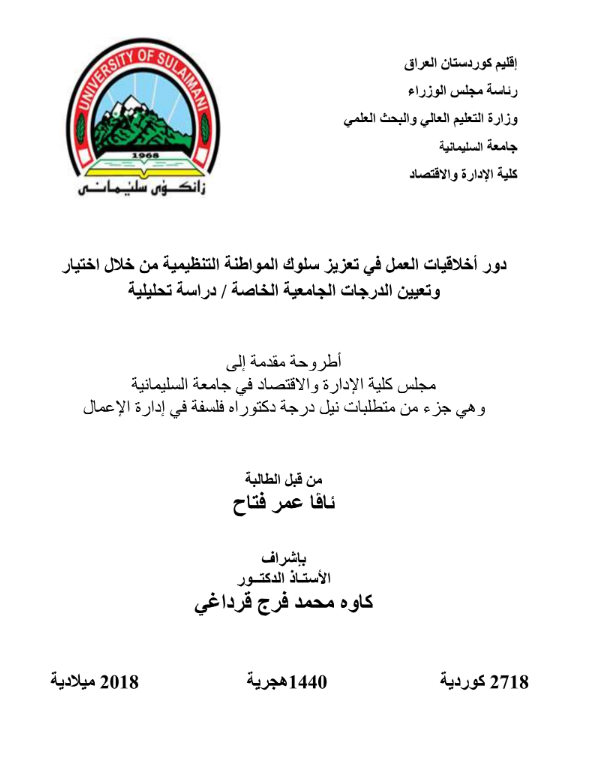ڤەکۆلینا بەڕێوەچوونی کۆنفرانسی -
The Role of Work Ethics on Enhancing Organizational Citizenship Behavior through Selection and Hiring University Special Grades in Kurdistan Region- Iraq

ڤەکۆلینا بەڕێوەچوونی کۆنفرانسی -
The Role of Work Ethics on Enhancing Organizational Citizenship Behavior through Selection and Hiring University Special Grades in Kurdistan Region- Iraq
Ava Omar Fatah
Purpose: The present study seeks to develop the intellectual contents of the work
ethics, selection and hiring in order to determine the behavior of organizational
citizenship in the public universities in the Kurdistan Region of Iraq. This will be
accomplished at three levels. Level of Description: Identification, diagnosis and
presentation of the philosophical content of human resources management and
organizational behavior in the modern administration thought is represented by the
work ethics and its impact on organizational citizenship behaviors through the
selection and hiring of special grades in public universities.
The level of analysis: Analyze and present the impact of work ethic represented by
(Ethical leadership, individual ethics, organizations structure and systems, political
inheritance) on organizational citizenship behavior and its dimensions (altruism,
civic virtue, consciousness, sportsmanship, courtesy) through selection and hiring
of special grades by their standards (selection and recruitment policies, knowledge,
skills, competencies) in public universities.
The level of prediction: the formulation of a scheme for the selection and hiring
of special grades in the public universities of the Kurdistan Region and the
development of specific expectations on the nature of the relationship and the
impact between the variables investigated.
Problem statement: The study started from a problem expressed by a number of
intellectual and practical questions. The most prominent of these are: Does the
work ethic affect the organizational citizenship behavior by selecting and hiring the
special grades in public universities by focusing on the deans of the colleges? Are
the policies of selection and hiring of the Deans having scientific foundations in
the universities of the Kurdistan Region of Iraq? What is the level of current study
variables in the surveyed universities? What are the moral factors that must be
emphasized in order to promote the practical reality of the selection and hiring
process, which can contribute effectively to the successful adoption of the concept
of organizational citizenship?
DESIGN / METHODOLOGY: The researcher used the analytical descriptive
approach in her current study. In order to achieve the objectives of the study and to
answer the above questions, the researcher adopted a virtual model that reflects the
nature of the relationship of correlation and influence between the variables of the
study and its dimensions, based on a number of hypotheses, the principal and
subset were subjected to a series of statistical tests through the SPSS V 21) and
(Amos Vr. 22).
The population of the study had effectively represented all the public universities
in the Kurdistan Region of Iraq exclusively, involving (444) department heads to
assess the reality of the behavior of the deans. The questionnaire was used as a
primary tool for collecting study data, as well as the use of personal interviewswith decision makers at the Ministry of Higher Education, and the method of
observation (direct monitoring) of the selection process. (444) questionnaire were
distributed to all department heads in the surveyed universities, 387 were retrieved
and the number of valid forms was 229.
After evaluating and testing the reliability and consistency of the measuring
instruments, data analysis and hypothesis testing were carried out using appropriate
statistical tools such as linear programming models, critical path analysis. The
results showed the validity of most of the hypotheses of the study. Based on this, a
number of conclusions were formulated, the most significant of which was the
significant effect of the independent variable (work ethic) in the dependent variable
(organizational citizenship) in the presence of the intermediate variable (selection
and recruitment). That’s to say, the presence of intermediate variable will improve
the effect of the work ethic in the organizational citizenship of the investigated
universities. The percentage of influence increased from 67.5% in the absence of
the intermediate variable to 79.6% in the presence of the intermediate variable.
Based on the conclusions, the study reached a number of recommendations, the
most important of which is that; the investigated universities implement the ethics
of work and its dimensions in applying the criteria of selection and hiring in the
selection of candidates for leadership positions at different levels and
administrative position within a regulatory and administrative structure that is
applicable in order to reinforce citizenship in addition to necessity for the public
universities to hold into the proposed model in the current study when conducting
the selection process. The study concluded with a number of proposals for further
studies.
The originality of this study is the first study that embraces the three main
variables together, and considered among the first studies that presented the
practical reality of the process of selection and hiring of special grades in the
universities of the Kurdistan Region of Iraq.